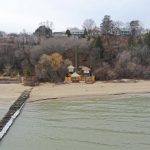12,500 Held in County Jails Could Vote
ACLU, League of Women Voters working to help these eligible state residents to vote.
There are about 12,500 people in Wisconsin’s county jails at any given time, according to the Wisconsin Department of Corrections. Most of those people are serving misdemeanor sentences or have been charged with a crime but not yet convicted and are in jail before trial because they can’t afford to post bail.
None of these people has been convicted of a felony and they still retain their right to vote, yet because of the obstacles presented by the realities of jail they’re at risk of being disenfranchised anyway.
The ACLU report found that 28 counties have vague policies around jail voting that don’t even touch on the specifics of Wisconsin election law. Some counties use guidance established by the Government Accountability Board, a body that no longer exists.
Since the release of its report, the ACLU has been working with outside groups such as the League of Women Voters and All Voting is Local, community organizations, county clerks and sheriff’s offices to build better policies and help prevent the disenfranchisement of Wisconsin’s jailed residents.
People in jail are already dealing with a number of challenges — but that shouldn’t mean they lose their vote, says Ryeshia Farmer, Rights for All Campaign coordinator at the ACLU of Wisconsin. The onus shouldn’t be on the incarcerated person to initiate the process, she says, instead it’s on jail administration and county sheriffs.
“There’s definitely some people in the care of jails, if they are normal voters they’re thinking about how to make it happen pending their trial,” Farmer says. “There are also some circumstances where people in the care of our jails don’t know they should ask. They assume because they’re in jail their rights are automatically revoked. The ACLU has a stance that the burden shouldn’t be on the voter in jail to ask, the burden should be on the jail.”
Peter Burgess, Wisconsin campaign manager for All Voting is Local, says the first obstacle to be cleared is making sure people know their rights.
“The fact that a vast majority of people in our jails are eligible to vote, they may be in jail pretrial or serving a sentence for a misdemeanor, folks need to know that their right to vote has not been taken away,” Burgess says.
Jail and elections administrators in the state’s most populous counties, Milwaukee and Dane, say their efforts to help inmates vote have been going well.
“We want to make sure everybody has that ability to cast their vote,” Dane County Sheriff’s Office spokesperson Elise Schaffer says.
The Milwaukee County Sheriff’s Office did not agree to an interview, instead sending a list of its policies and procedures around jail voting — which include helping people get proper identification.
Despite the optimism expressed by officials in the state’s two largest county jails, Burgess says he’s still got a lot of unanswered questions that jail administrators attempt to deflect.
“To be frank there are a lot of obstacles, a lot of excuses are given,” Burgess says. “I want to give credit where credit is due; in many cases sheriffs have taken big steps. But excuses like ‘most individuals aren’t here for very long’ — they’ll point to positive things that are happening and shift the conversation away from unanswered questions.”
How many registrations were added in the last week? How are inmates being informed about deadlines? Are people helping them through the process? How are they accessing proper IDs? Who is serving as a witness? Burgess says he’ll continue to push for answers to all of these questions in the remaining weeks to make sure administrators know there’s pressure on them to ensure access to the ballot.
“In the last month we’re asking a lot of questions,” he says. “Making sure jail administrators know we’re watching will lead to movement.”
At the state’s eighth-biggest jail, in Eau Claire County, officials are less sure that they’re doing everything possible, although they are pleased with the progress they’ve made this year in improving processes and engaging the community in helping.
But when the ACLU sent its report out this summer, jail Captain Dave Riewestahl says he was intimidated by the prospect that all the work would fall to him.
“Looking back, when I first got that ballot toolkit from the ACLU, a lot of it said ‘the jail, the jail, the jail’ a lot of it felt the onus was on me to do it alone,” he says. “Diving into it step by step and ask by ask, it doesn’t fall solely on the jail, the sheriff. We reached out to the community and asked, ‘How can you help support this?’ They volunteered their time, expertise, efforts.”
Riewestahl says a number of steps have been made since the report was released to follow its recommendations. The kiosks in the jail used to access things like legal resources have been updated to allow access to the MyVote.WI.gov website which allows inmates to register to vote, request and track absentee ballots.
The jail’s re-entry social worker has been established as a voting liaison to help people with the process.
For people who have IDs at home, Riewestahl says efforts are made to have family members or friends bring them into the jail. For the people with no ID, the jail works to help them get a temporary one.
Last week, a community group, Chippewa Valley Votes, came to the jail for a voter registration drive, according to Riewestahl. He says it was “monumental” for them even though there were some hiccups that needed to be worked out.
At the end of the day, Riewestahl says voting is an individual choice for everyone, in or out of jail, but it’s on him to make sure there aren’t obstacles for the voters in his care.
“My opinion or feelings are that voting is important and a true life skill that needs to be utilized whether they’re in custody or out of custody,” he says. “When people are in custody things get harder, but voting shouldn’t be one of them. There are some hurdles but ultimately the ability to vote needs to be utilized by everybody eligible to vote.”
“The people in the Eau Claire County jail are the community; the community needs to support those they don’t see on a daily basis,” he continues. “Nobody spends their entire life in the Eau Claire County jail, so understanding how to vote is an important life skill.”
One of the biggest hurdles to voting for some people in Wisconsin’s jails occurs because of a gap in election-related deadlines in Wisconsin, according to advocates and officials. The deadline to request an absentee ballot is Oct. 30 and election day is Nov. 3.
For most voters who miss the absentee request deadline, the option left to them is going to vote in person on election day. But what if a person who was planning to vote in person is arrested on Oct. 31 and unable to post bail until Nov. 4?
This person hasn’t been convicted of a felony yet, but won’t be able to go to the polls on election day. Riewestahl says he can’t figure out how to alleviate this problem because the sheriff’s office can’t unilaterally decide to release people — that’s up to a judge.
“This was an obstacle that I can’t find a way to overcome,” he says. “Sheriff’s offices don’t have the authority to release people.”
Establishing a polling place in the jail is impractical, according to Riewestahl, because there are people from 18 different Eau Claire County municipalities in the jail. This means each municipality would have to send a poll worker just to collect one or two votes — at a time poll workers are already hard to come by.
The best solution, one proposed by Riewestahl and Burgess, would require a change to Wisconsin election law. The state has a process to help voters who are hospitalized in the days leading up to an election; that process could be extended to include incarcerated individuals.
If someone is in an accident before election day, they can send an agent to go to the polling place, pick up a ballot, bring it to the hospital to be filled out and returned to the poll.
Ultimately, jailed voters don’t make up a very big part of Wisconsin’s electorate. But in a state as essential to the results as Wisconsin, every vote counts, and Burgess says people in jail understand the power of their vote and want to exercise their rights — they just need to have some hurdles removed.
“I get the impression folks do understand how powerful the vote is,” Burgess says. “It might not be the first thing on folks’ mind when they’re in jail, but jail administrators should not just be responding to requests, they should be providing information — nonpartisan information about how to request a ballot and vote. There should be proactive outreach.”
Reprinted with permission of Wisconsin Examiner.






















